European Nature Academy: Face-to-face Workshops for Natura 2000 Marine and Forest Managers
European Nature Academy is an innovative co-learning platform offering cost-free training courses focusing on the competencies required to manage Natura 2000 and Protected Areas more effectively.
Courses focus on core competencies, including stakeholder engagement, communication tools and techniques and management planning. Specific attention is also given to the management of forest and marine ecosystems.
In LIFE ENABLE, Forest and Marine participants are organised in ‘PODs’ – these are small groups created to enable closer joint-working and co-learning between peers.
As part of the ENA programme, participants engaged in interactive courses that were comprised of multiple modules. These courses offered a variety of materials, including live online sessions, videos, e-books, and reading resources, which enabled participants to gain a broader understanding of the training topics. The courses also included interactive activities and assignments that encouraged participants to apply their newly acquired knowledge, as well as their existing skills and experiences. As a culmination of the online courses, face-to-face workshops were organised for Marine Participants in France and for Forest Participants in Austria. These workshops provided an opportunity for participants to put their knowledge into practice and interact with peers and experts in their respective fields.
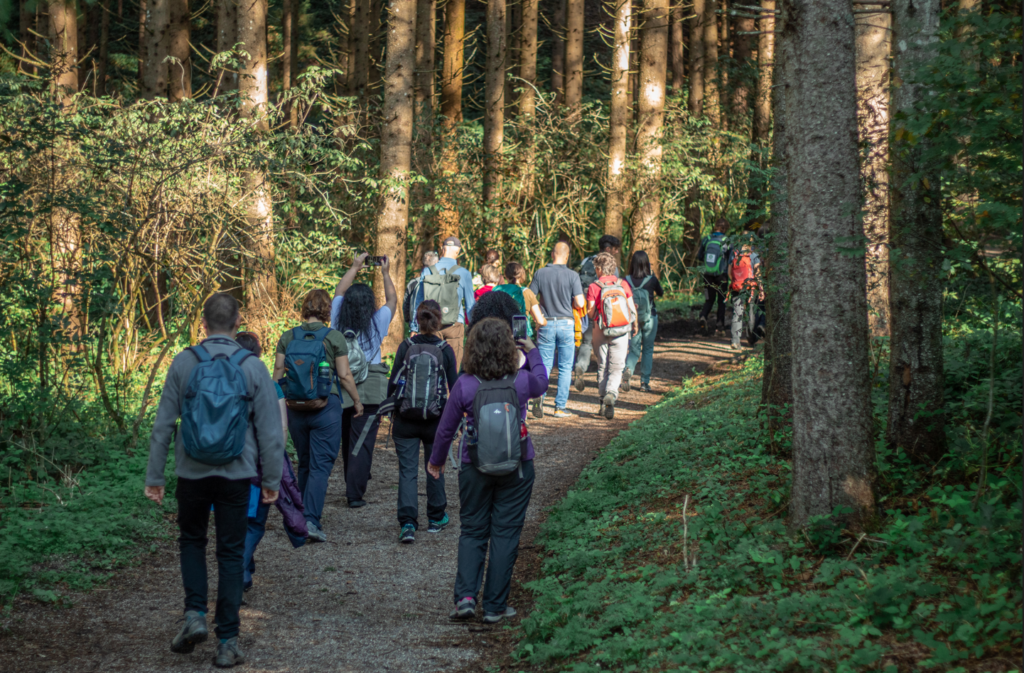
Forest Workshop took place in Austria
Tools for Natura 2000 Forest Managers
Online courses
The Tools for Natura 2000 Forest Managers course offered insights into:
- Forest conservation and management in Natura 2000
- Forest ecology
- Integrated Natura 2000 Site Management
- Monitoring and assessment
Face-to-face Forest Workshop in Austria
This 4 days workshop was hosted by E.C.O., with support from TESAF and FUNGOBE. A total of 27 participants from Norway, Germany, Cyprus, Spain, Croatia, Lithuania, Austria, Finland, Romania, Germany, Italy, UK, Belgium, Portugal, Latvia, Greece, and Slovenia visited multiple Protected Areas to engage in a range of field-based discussions about management practices being applied.
The workshop included visits to Nature Park Dobratch and Natura 2000 site Leonstein. Robert Heuberger. The Department of the Carinthian Government for Environment, Nature Conservation and Coordination of Climate Protection welcomed participants, followed by Stefano Santi, representing EUROPARC. The topic of the morning visit was climate resilient forests, where the host presented the forestry measures in the Nature Park to create more resilient forest stands. In the afternoon, participants visited the Natura 2000 site Leonstein, to discuss visitors and carrying capacity. The Protected Area is located in an area with considerable tourism: pressure from tourists, leisure tourists and recreationists is massive in the summer months. The area has a very dense network of hiking trails. At the end of the visit to a beech forest stand, a short POD task was organised where participants reflected on the positive and negative points of forest management at the two sites.
On the following day of the forest workshop, the group travelled to the Vellacher Kotschna (AT) in South Carinthia, a Natura 2000 site. The group held a discussion about the challenges of establishing monitoring indicators and explored management practices in privately owned forests within Natura 2000 sites. Later in the afternoon, the group crossed the border into Slovenia and was accompanied by hosts from the Nature Conservation Institute (Davor Krepfl and Sonja Rozman) to an old-growth forest situated in the Kamnisko-Savinjske Alps. The group had an informative session with the hosts, where they discussed the differences and similarities in Natura 2000 management across borders. At the end of the day, Erika Vaida Bela from ProPark organised an exercise that allowed the group to reflect on the day’s topics.
During the visit, the group explored the European Nature Reserve Lendspitz Maiernigg. It represents the last remaining 500 metres of the lake’s natural shoreline with reed belt and adjacent wetlands in an urban setting. The focus of the visit was on invasive species, and Susanne Glatz Jorde from E.C.O. led the group through the area with several stops along the way. An activity was organised where each POD had to identify the invasive species they found in the field. During the lunch break at the Lendkanal on the shore of Lake Woerthersee, Ms. Sara Schaar, the representative of the federal government, spoke to the participants and offered future cooperation in the development of conservation projects.
Later in the afternoon, the group gathered to receive an overview of the guidelines for the final assignment from Mike Huber from E.C.O. They then selected their topics, developed structures for the final paper, and sought feedback from the scholars on their topics.
Following the long day of work, the group concluded the official part of the Forest face-to-face meeting. They were greeted by the vice-Mayor of Klagenfurt, and Hanns Kirchmeir from ECO supported the straightening of Natura 2000 managers network through the LIFE ENABLE project.
The last optional excursion day near Lake Ossiach included a hike through a beautiful beech forest to the Finsterbach waterfalls. The group also enjoyed a breathtaking view of the Ossichersee from the Gerlitzen before driving to the Bleistaeter Marshes, which were previously intensively used as farmland. In 2002, it was designated as a Natura 2000 site after restoration measures were taken. Since 2017, the landscape in the Bleistaeter Wetland area has changed dramatically. Extensive shallow water areas and wetlands have been created on land that was once used for agriculture, with the aim of improving the water quality of Lake Ossiach. This creates an attractive habitat for rare animal and plant species and a unique recreational area.
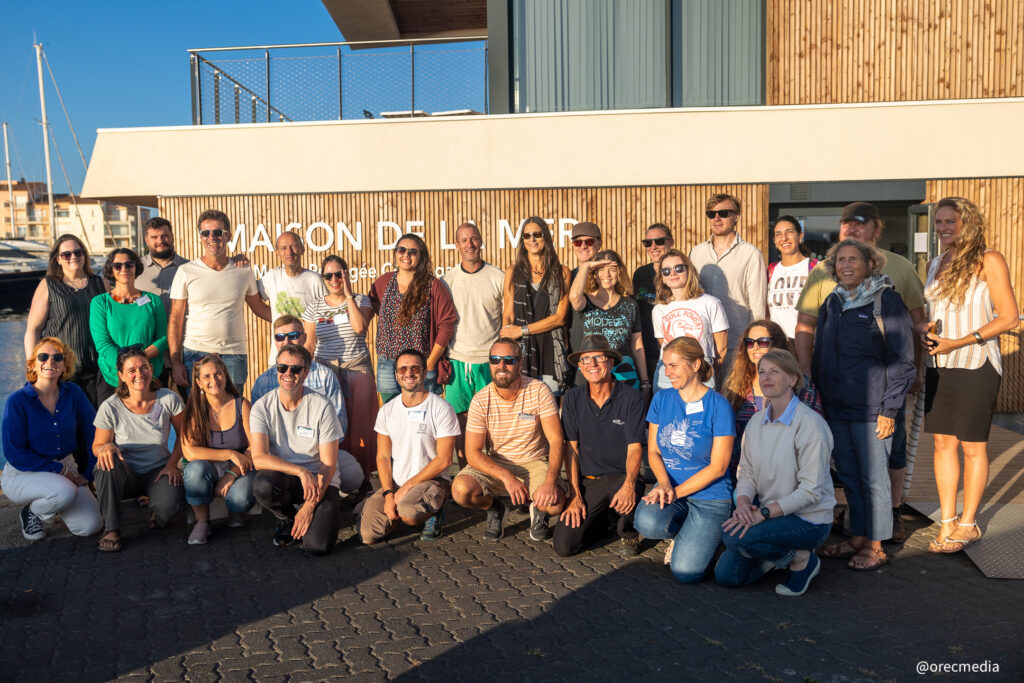
Marine Workshop took place in France
Tools for Natura 2000 Marine Managers
Through its modules, the Tools for Natura 2000 Marine Managers course highlighted the following topics:
- Policy and governance frameworks for Marine Protected Areas and Natura 2000 Marine Sites
- Marine Protected Area Management Planning
- Compliance and enforcement
- Management Effectiveness
Face to face Marine Workshop in France
The Marine face-to-face Workshop gathered 21 participants from Greece, Lithuania, Malta, Sweden, Scotland, Finland, Italy, Croatia, Spain, Cyprus, and Albania in Agde, France.
The focus of the first day of the workshop was to learn about the different ingredients of an effective MPA network, including selecting sites that work together operationally and understanding the added value that a network can bring to the managers of the MPA.
Through practical exercises, the participants worked on identifying, developing and putting together the main components for their own (fictional) successful MPA network.
The second day of the workshop was dedicated to constructing an effective management plan for MPAs. The participants started by defining the legal framework for an MPA and then worked on identifying target resources, assessing and analysing threats, and developing SMART objectives through practical exercises that helped visualise and make tangible the creation of these plans.
Building on the outcomes of the previous session on the design of an effective MPA Management Plan, the team of the MPA of Côte Agathoise presented their management plan. This covered how their actions have progressed over time and as their operational structures shifted from working as an association to becoming part of the municipality and operating in collaboration as of this governmental branch.
The second part of the second day was dedicated to designing and developing a management strategy that can impact different types of human behaviour that are harmful to the MPA’s target resources. The participants also worked on establishing monitoring and evaluation plans to track the effectiveness of their management strategy.
The day ended with a meeting with different stakeholders who are active within the Côte Agathoise MPA premises. Hosted in La Maison de la Mer, they presented their contribution to biodiversity conservation in the Protected Area and responded to questions from the participants.
During the last day of the Marine workshop, participants learned how to link strategy to law enforcement in MPAs. They learned how to recognise violations, track them, and stop them. The participants worked on identifying threats and the different actions they can take to help prevent illegal activities against the protected species and in no-take zones. They discussed the intricacies of preventing law breaches when it comes to recreational fisheries, as well as other illegal activities they usually encounter in their MPA.
To give participants an idea of how they can utilise law enforcement agents to protect their MPAs, the MPA of Côte Agathoise invited two officers from the rural police task force. The officers gave an overview of their mission within the MPAs and the different methods they use in case of illegal activities spotted in the zone. These methods include gentle reminders, verbal warnings, fines, and arrests. They also explained the training they had to go through to qualify for such missions.
Applying the skills on the ground
During both workshops, ENA participants had unique opportunities to experience various Marine and Forest ecosystems. They engaged in active discussions with experts and collaborated with their peers on interactive assignments, all while visiting breathtakingly beautiful Protected Areas in Austria and France. To get a glimpse of their productive workshops and experience the atmosphere, you can browse through the photo album capturing the highlights of their learning journeys.
ENA second round of applications
Did you find these insights interesting? Would you also like to enhance your skills, whilst networking with nature professionals from all over Europe?
If the answer is yes, you are in luck! European Nature Academy is currently still accepting applications for the 2nd intake of participants. You have a chance to apply until November 4th! Learn more and apply here!
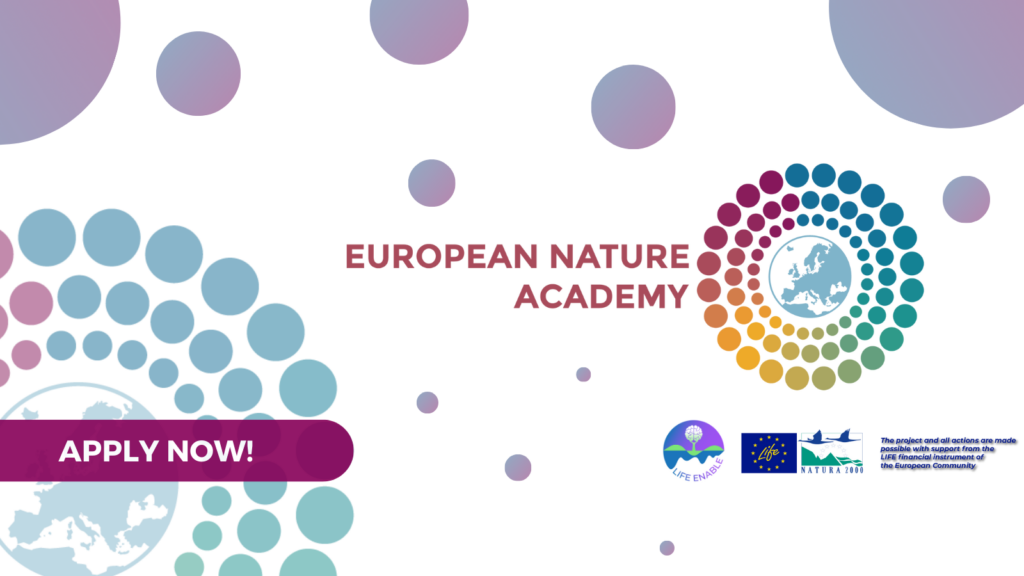
European Nature Academy: Apply now!
ARE YOU READY TO BE ENABLED?
Get the skills and training you need to become more effective, competent and confident nature managers!
About LIFE ENABLE & the European Nature Academy (ENA)
Natura 2000 and Protected Area managers work in a wide variety of roles, in multidisciplinary settings. Where you work is likely to be dynamic, constantly evolving and complex.
You routinely face challenges and opportunities in your daily work, which require you to apply a special mix of knowledge, skills and attitudes. In almost all cases, as well as technical conservation skills, you need to work inclusively, in cooperation with local communities and other organisations: in this, you need to be able to communicate what you are doing and why. The management choices you make and the ways in which you work are critical to achieving progress towards your objectives for nature.
LIFE ENABLE is designed to meet Natura 2000 and Protected Area managers’ training needs. It is creating the new European Nature Academy (ENA) to provide tailor-made training and support your professional development.
The goal is to contribute to ensuring progress towards the realisation of the objectives and ambitions of the EU Biodiversity Strategy 2030 and underpinning policies.
To achieve this, the ENA’s cost-free training courses focus on the competencies required to manage Natura 2000 and Protected Areas more effectively.
Who should apply?
At this stage, we are looking for 100 individuals working currently in Protected Areas across Europe. Once selected, you will become part of the ENA and enroll as participants to the courses.
The courses focus on core competencies, including stakeholder engagement, communication tools and techniques and management planning. Specific attention is also given to management of forest and marine ecosystems, so we are giving priority to managers of these habitat types, especially in Natura 2000 sites. When you apply, simply let us know which habitat type is of more interest to you – either forest or marine, but you can’t pick both!
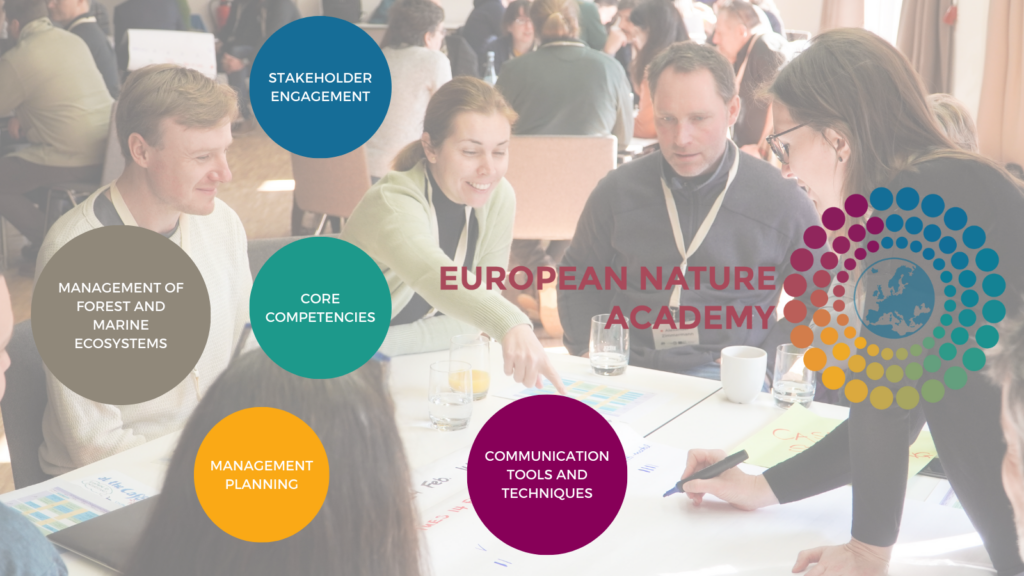
Whatever your area of work, we will welcome your application. People of all ages and backgrounds, working in diverse roles in a Natura 2000 site or Protected Area can apply – for example:
- Managers in either governmental or non- governmental organisations.
- People working in national, regional or natural parks (which also include Natura 2000 sites), for example Rangers.
- Individuals working for a local authority or public administration with responsibilities for nature conservation and protection.
- Individuals working as a specialist ecologist or in nature conservation policy.
- People working with local communities – for example, as environmental educators, communication specialists, volunteer or visitor managers, or individuals with responsibilities for interpretation, nature-based sustainable development, legal advisors, land stewardship etc.
- Private landowners of a Natura 2000 site or other entrepreneurs in a Protected Area – for example, with farming, forestry, fishing or tourism interests.
How the European Nature Academy works…
The new European Nature Academy is a training hub and provides access to a series of practical capacity building courses for nature’s managers. The courses are designed specifically to equip individuals and their organisations with the competencies they require to meet the challenges and opportunities of nature management in the coming decade.
Delivered in a series of online modules and networking events, the emphasis is on applied learning to improve management practices and ways of working for Natura 2000 & Protected Areas across Europe. The modules focus on the core skills, knowledge & attitudes you need in your daily work.
The competence-based modules cover the following subjects:
- Tools for participative and inclusive governance
- Design of communication strategies, tools, techniques and approaches
- Management planning as a technical process for biodiversity conservation & a process for social engagement
- Strategies for engagement, collaborative working, conflict management, resolution & mediation
The courses are free!
There is no fee for the training.
APPLY NOW!50th-anniversary special | Presidents of EUROPARC: Moments that shaped the Federation
With a grand celebration like a 50th birthday comes a wonderful opportunity to gather significant people who have influenced and shaped us. It’s a chance to showcase how far we have come by celebrating our accomplishments and successes.
It’s a time of reflection and gratitude.
So who better to talk to than EUROPARC Presidents?
Already interested in hearing the reflections of Dr Patrizia Rossi, Michael Starrett, Erika Stanciu, Thomas Hansson, Ignace Schops, and Michael Hošek?
Then enjoy our special podcast, which includes insights about the key moments that have led EUROPARC to where it is today.
Celebrating our 50th anniversary at the EUROPARC Conference
Taking place during EUROPARC’s Golden Anniversary year, the Conference provides a place for the EUROPARC network to reflect on 50 years of Connecting People and Parks, and look to the future. We feel incredibly honoured to have the opportunity to bring together all the exceptional people who have devoted their lives to nature protection.
Let’s celebrate together! We look forward to meeting you in Leeuwarden, the Netherlands, from 3 to 6 October.
You can listen to other EUROPARC Podcast episodes here. Enjoy!
Dr Arnold Boer | In Memoriam
With sadness, EUROPARC announces the passing of our friend and colleague, Arnold Boer.
Dr Boer had been involved in coordinating the National Parks system in the Netherlands and brought his quiet but determined diplomatic skills into EUROPARC during turbulent times in the 1980’s. He served on EUROPARC council as Treasurer from 1987 steering calmly the finances and setting the foundation for a more secure future.
It was, however, the Transboundary programme, that became his real passion in EUROPARC. Having been involved since its inception, he oversaw the Basic Standards and Certification that are the foundation for transboundary cooperation across Europe. Chairing the Transboundary Steering and Evaluation Committee (STEC) he brought new Transboundary areas into the network and with the creation of the TransParcNet his gentle guidance ensured meetings were infused with friendship.
He leaves a legacy in our programmes, in our parks and in many hearts across Europe.
A true gentleman, always available with sound advice and wisdom gained from many years of experience. Never without a colourful scarf draped elegantly over his shoulders, his thoughtful, calm presence will be sorely missed by all in EUROPARC.
Our deepest condolences go to Arnold’s Family at this sad time.
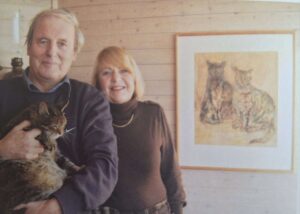
Some words from the Transboundary family
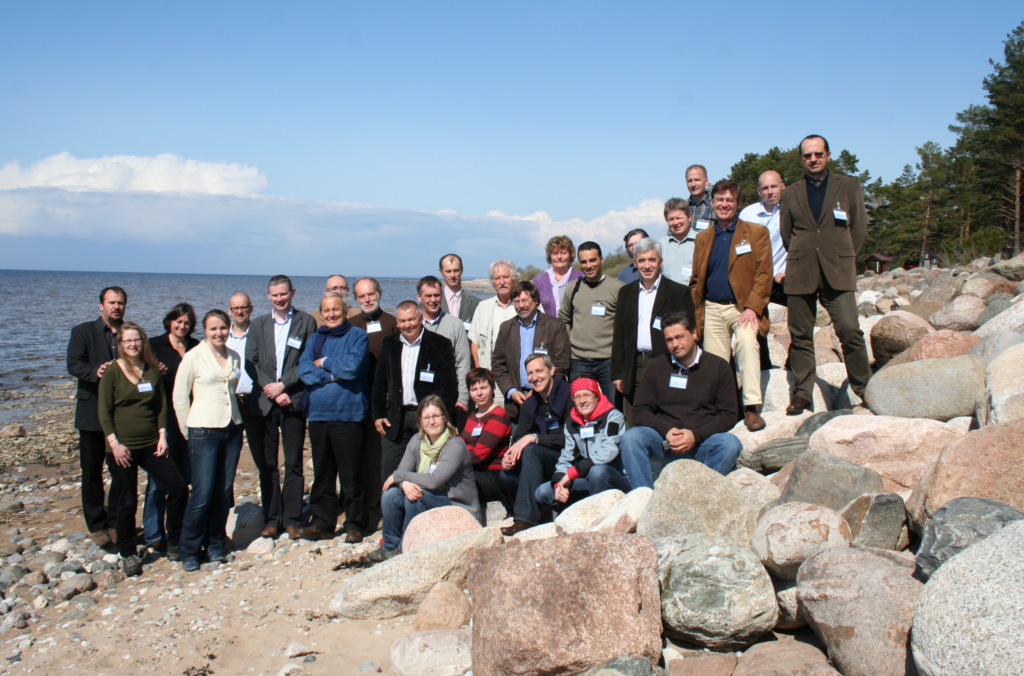
Our warmest thoughts go out to Arnold’s loved ones, when we received the sad news of his passing.
We will always remember Arnold with warmth, his thoughtfulness and calm nature.
His long experience and knowledge about transboundary issues will be missed by all of us in STEC.
Tiia, Handrij and Matti – STEC
Thanks to his passion and expertise he has allowed me to fully understand the meaning and value of transboundary parks.
A person of profound humanity and serenity, always ready for confrontation and dialogue, and also to share moments of leisure and joy.
TB family will miss him.
Stefano Santi – EUROPARC Council member
He lived his life so fully and passionately, followed his beliefs and backed them up with immense intelligence. Always ready for a conversation, which he was able to support with humour. His enthusiasm for a Transboundary and united Europe was beyond measure.
He will be in my thoughts for many reasons today and in the future.
Mojca Smolej – TB Task Force Co-chair
Arnold was the person in the Netherlands responsible as a civil servant from the Dutch government for the implementation of the Dutch scheme for national parks (21).
In the EUROPARC Federation, Arnold was several years treasurer and Initiator together with a colleague from Finland of the transboundary Programme. And until now member of the STEC. In the beginning, Arnold himself was a verifier. And he was always a participant in the TransParcNet Meetings.
Leo Reyrink – TB Task Force Co-chair
You will be able to see the picture album from the TransParcNet meeting in Oulanka National Park in 2019 that Dr Boer was a part of below: